Last Sunday, Australian rugby fans woke up to their now annual Bledisloe hangover with heartache caused by missed line-out opportunities, poorly executed kicking and the familiar All Black attacking onslaught at that seemingly impenetrable fortress of Eden Park.
But they also woke up to an announcement in the Sydney Morning Herald that the game’s administrators were likely to shelve the infamous ‘Giteau Law’, a criterion introduced in 2015 that allowed for Wallabies selection of overseas players with a minimum of 60 Test caps in the bank and instead clear the way for Wallabies to be selected from anywhere in the world, regardless of prior Test experience.
While it will be seen by many as a knee-jerk reaction to a record Bledisloe thumping, the merits of making Wallaby selection an open market á la the Socceroos has been debated for some time. In the words of Rugby Australia CEO Andy Marinos, “I’m not saying it’s going to be Alpha and Omega”.
Fitting, given that some would say that the decision making process at RA is all Greek to them.
Reactions across social media by Wallabies fans have appeared mixed.
There have been ‘on the fence’ observations from some sports journalists who are weighing up the pros and cons.
Former players, now pundits, like Wallaby Drew Mitchell and All Black Sonny Bill Williams, who are both employed by Stan Sport as part of the rugby commentary team, provided glowing praise of this proposed scrapping, with an “Amen!” and the assertion that this was what “the Wallabies need right now to be more competitive at the highest level.”
Here’s why this is a bad idea for the Wallabies and why it would compound the already fragile situation Australian rugby union finds itself in.
Let’s firstly examine who this change in policy would actually be targeted at.
It is quite likely attempting to retain, for the next World Cup cycle, players who are currently within the system, have less than 60 caps and are considered to be likely starters in any Wallabies match day 23.
This is Marika Koroibete, Brandon Paenga-Amosa and Isi Naisarani, all due to depart Australia at the conclusion of this year’s Rugby Championship or European Autumn Tour (if it eventuates in these uncertain times).
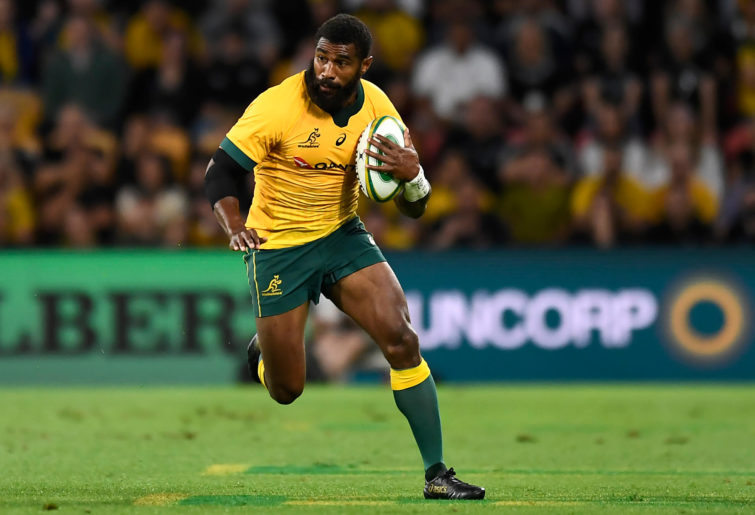
(Photo by Albert Perez/Getty Images)
It is possibly also trying to retain former vice-captain Samu Kerevi, a 29-Test player who has only spent two seasons away in Japan but remains contracted there until 2022, and through circumstance and the ‘two person overseas policy’ instituted by Rugby Australia in 2020, finds himself back in Dave Rennie’s 2021 playing squad.
All these players solidified their position in recent years, will have had time under current head coach Dave Rennie and presumably are part of his plan for the 2023 Rugby World Cup in France. Yet, on current form, you would only assume Koroibete to be a certain starter.
Then there is a second group this proposed law scrapping is aiming to capture. The lost men of Australian rugby who left us all too soon for contracts presumably too great to pass up. Men who are still in the prime of their career and may have even improved in ability and game maturity with time spent overseas.
There’s Will Skelton, who had success at Saracens before moving to French club La Rochelle, and his compatriot and fellow lock Rory Arnold, who faced off against him in this year’s Top 14 final for eventual winner Toulouse.
As if Europe didn’t have enough Australian second row diaspora residing there, Adam Coleman has been featuring for London Irish in the Gallagher Premiership.
Back in France, in the capital, 15-Test capped hooker Tolu Latu features for Stade Francais whom he joined just after the 2019 World Cup.
Then there is the fiery flanker and former 7s player Sean McMahon, who has been at Japanese club Suntory Sungoliaths since 2018.
Should any of these rugby nomads be at a Super Rugby club in Australia now, they would be certain starters, if not holding down leadership positions within the team. So, it’s reasonable to assume they would be in the mix for Rennie to repatriate, should he be given the opportunity.
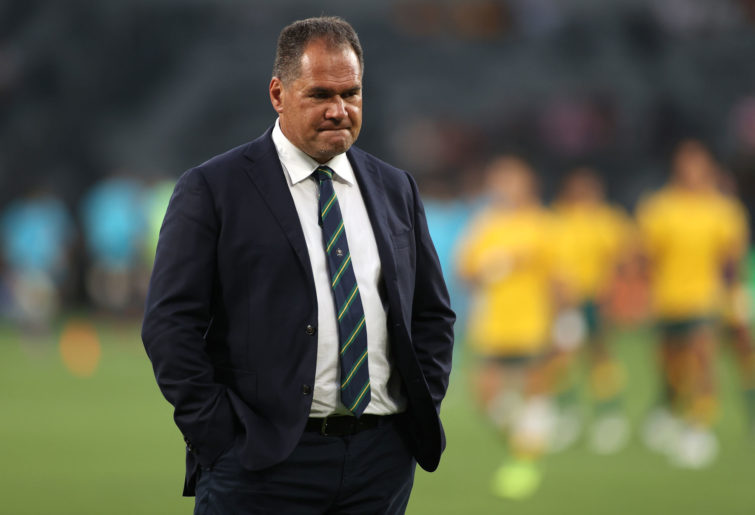
(Photo by Cameron Spencer/Getty Images)
But what suggests that these players will be the hail of magic bullets that can help the Wallabies regain the Bledisloe Cup in 2022 or be in the mix to win a World Cup? The last time Skelton, McMahon and Coleman featured together in a gold jersey, Australia lost a home series to England 3-0 for the first time ever.
Lotu, Arnold and even Kerevi were main-stayers in the Wallabies squad in 2018 that lost a home series to Ireland and achieved the worst record in 50 years. All three then stayed on for the World Cup in Japan the following year where Australia was outsmarted by Wales in their pool match, before being unceremoniously dumped in the quarter-final by England.
If the suggestion is that these players have improved by being exposed to better competitions, clubs, players and coaches overseas, then what is the measurement of that improvement? And isn’t that simultaneously an alarming indictment on the state of the Australian professional environment that ought to be addressed?
Competition-wise, it is difficult to argue against the fact that the opportunity to play New Zealand provinces every year offers players the opportunity to face some of the best rugby in the world and develop their skillset, build character and slowly but surely improve as a collective unit.
In Marinos’ own words after Australia’s franchises were beaten 5-0 in the first round of Super Rugby Trans-Tasman 2021, “It’s good for us to benchmark ourselves.”
English professional club rugby did benefit Skelton, who admittedly dropped excess weight upon arriving at Saracens and started to produce match fitness that allowed him to impose himself as all good locks should.
Whether this was the result of a superior international development structure, or the motivation to remain employed and well remunerated, remains to be known.
But let’s argue that the addition of four-to-five overseas Wallabies will bolster the team and provide, as Marinos puts it, “A lot more experience and a lot more depth across the board.”
What message does this send Darcy Swain, Matt Philip or Lukhan Salakaia-Loto when they are replaced by one of these nomads?
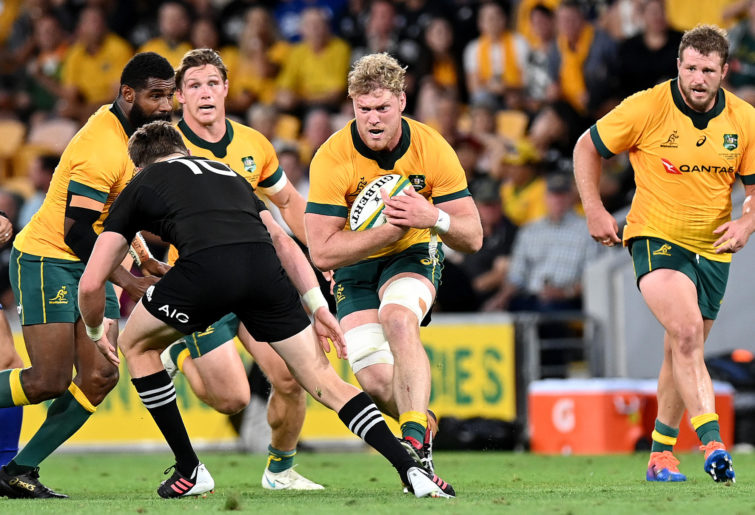
(Photo by Bradley Kanaris/Getty Images)
How long would they honestly bother to remain playing for the Brumbies, Rebels or Reds when a major incentive to stay in Australia has been removed and they would be able to double their salary in Europe or Japan? Izack Rodda will be kicking himself for not buying a return ticket from Paris to Perth.
Suddenly, none of our other Wallabies become obligated to stay local for the majority of their playing career and that opportunity to have your cake and eat it too is presented to everyone. Negotiated short-term sabbaticals become a quaint feature of 2020 and player agents will be hot on the lines talking to the highest bidder.
It was an odd sight earlier this year when Stan Sport started advertising the rugby season on buses, billboards and across cities to maximise the contra component of the Nine Network deal with Rugby Australia. We all felt chills of excitement that the reset led by the Super Rugby AU competition would be the start of a watershed era.
Yet, the fly in the ointment was the marketing visuals in Sydney that placed Wallabies captain Michael Hooper front and centre of the “New Home of Rugby”, despite the fact he wouldn’t be spending a minute on the field during SRAU due to an agreement with Rugby Australia to take a sabbatical in Japan.
A marketing error this was not, as the announcement had been made long before Stan Sport had even signed on the dotted line. But instead it reflected the reality that after the recent departure of Kurtley Beale, Hooper was the only Waratah left who was recognisable to the general public.
And it is here that the future consequences of the proposed Giteau Law scrapping become stark. How hard is it at this moment in time to name or recognise any of the Wallabies playing among our five professional franchises right now?
It might be possible for rugby diehards who follow Super Rugby closely. But it’s a hard task to count past the fingers on one hand for many fair-weathers and indeed the general public that rugby so dearly needs to win back.
How much harder will that marketing exercise be when you suddenly no longer have names like Taniela Tupou, Jordan Petaia, Reece Hodge, Angus Bell, Tate McDermott or Harry Wilson running in local colours from February to May?
That’s not to suggest that these players have indicated any intention to leave Australia just yet (Wilson has gone on record to say it would take a lot for him to leave) but every player has a threshold.
We never thought we’d see Matt Giteau or George Smith leave Australian shores just shy of turning 30 or that a bright prospect like McMahon would depart at age 23.
Rugby is a business and players with shortened career spans are within their right to jump into the global rugby market.
But if we encourage that leap by making selection an open global ‘free-for-all’, Super Rugby AU as a product will devalue. Losing many of our top players, as we surely will over the following years, will have an impact on the buy-in from audience numbers and ticket sales.
It’s in contrast to the benefit of following an AFL team with their two-year minimum period for a rookie to remain at the club (with the club’s option to extend in years three and four) that not only helps the club’s stability but also allows the fan-base to see that young player blossom and grow.
Without any policy to encourage the best rugby players to remain in Australia, Super Rugby AU will simply become a development competition for promising talent to make their mark within two to three seasons, perhaps get a Wallabies cap and then consider the more lucrative offers that will come their way from overseas with little to no reason to stay.
If Rugby Australia is committed to making the Super Rugby competition with New Zealand and Pacific Island teams “a new dawn for rugby in the region”, then surely this proposed scrapping of the ‘Giteau Law’ is at odds with that ambitious objective.
There is another factor at play here.
In the professional era, and even in the amateur days, no strong rugby nation was made up of an assortment of players from different clubs. Nations that have won World Cups or been consistently dominant have been built through core groups of players. A group within the group.
The All Blacks of the 2000s have benefitted immensely by the Crusaders talent factory. The reigning world champion Springbok team, who have the same overseas selection policy now being considered by Australia, still had 11 current or former Stormers in their 23-man line-up that won the 2019 World Cup.
Argentina, who have got progressively more competitive in recent years, triumphed in their record win against the All Blacks in 2020, doing it with 20 current and former Jaguares players out of 23.
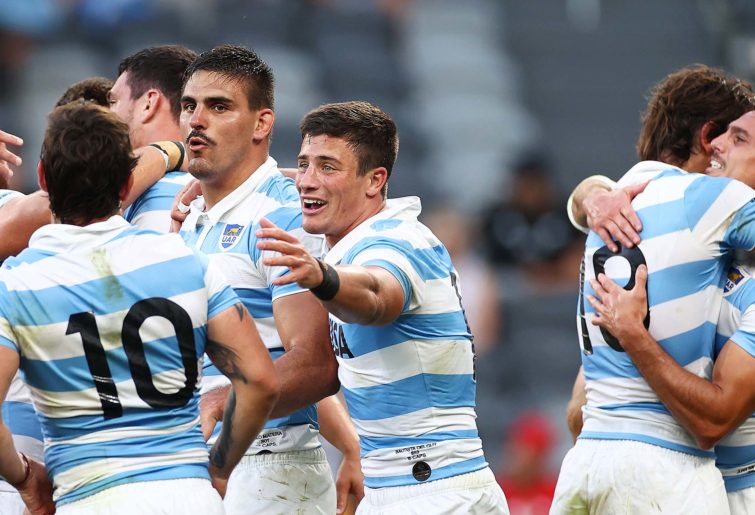
(Photo by Cameron Spencer/Getty Images)
The Wallabies, already with unfamiliar players desperately trying to build combinations with each other, will only add to this unfamiliarity by bringing back overseas players into the fold.
McMahon, Skelton and Arnold have had limited experience playing alongside Hooper, James Slipper, Reece Hodge and Matt To’omua. The rest of the team will largely be strangers.
Consider this cycle repeating itself over the next five-to-ten-year period and there will be far more gaps between player understanding and shared experience. The Wallabies will have started to go full Barbarian.
The Giteau Law, which was the first step towards an overseas selection policy, was hotly debated at its creation but widely applauded for the effect it had on bringing back its namesake Matt Giteau, as well as another veteran utility back in Drew Mitchell, in time for Michael Cheika’s 2015 World Cup campaign.
It was seen as a much heralded boost, with the Wallabies managing to help dispatch hosts England at the pool stage and navigating their way to a final, before being beaten in convincing fashion by the All Blacks.
The inclusion of Giteau and Mitchell felt justified: however, was that the dominant factor that took the Wallabies through to the final stage of the competition? Or was it perhaps the fact that the World Cup final line-up featured nine Waratahs – ten, if you count Mitchell?
And Matt Giteau would have been undoubtedly at home among former teammates as well as a sizeable number of Brumby brethren.
The novelty of the Wallabies bringing back two favourite sons seemed to overshadow the fact that the World Cup team of 2015 was no rag tag bunch, but instead a 2014 Super Rugby-winning Waratah spine led by their former Waratah coach and layered with experienced Reds and Brumbies.
A postscript to that Giteau Law innovation of 2015 that sticks with me is when I examine the recent career of Matt To’omua, who has recently struggled for form at the Rebels and continues to frustrate in his performances in the gold jersey.
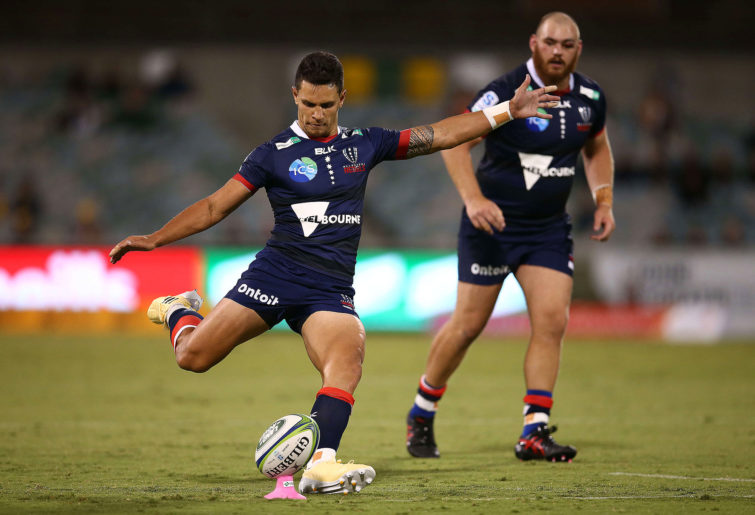
Matt To’omua. (Photo by Jason McCawley/Getty Images for the Melbourne Rebels)
An exciting prospect who made his name as a dynamic playmaker for the Brumbies, he featured in the Wallabies team from 2013 onwards but was kept out of the starting line-up for most of that 2015 World Cup by the return of Giteau.
At the conclusion of that tournament, To’omua suddenly announced a move to the UK to play for the Leicester Tigers, impressing in his debut season before injury setbacks disrupted the remainder of his tenure and he sought an early exit from his contract in a bid to have a second crack at Wallaby gold.
His return to Australian rugby was welcomed by all. However, instead of slotting back to the Brumbies where he made his mark, he ventured further south to the Melbourne Rebels and has not looked like that same promising player since.
Why To’omua interrupted his career and development for an overseas sojourn has never been plainly stated nor why he stated while at Leicester that he thought his “time in Australian rugby was finished”.
But if you had dedicated your entire career and worked hard to get into the Wallabies for years, only to have the leadership design a new law named after the very player who kept you from starting on the biggest stage of all, you might feel a bit slighted, too. One thing is for sure: he hasn’t been the same player since he returned
If Rugby Australia seriously intends to go down this path reversing a policy that has for a long time now served as a way of protecting the importance of the domestic game and helped keep that much-needed elite player base closer to home, it must surely do so on the basis of a well thought out and evidence-based review that accounts for an increase in team performance and addresses the commercial impact such a change will have on paying fans and, by extension, the major sponsors.
Because to make this change based on gut feel and desperation would be a near catastrophic decision for Australian rugby. And we can’t afford any more of them.

































































































